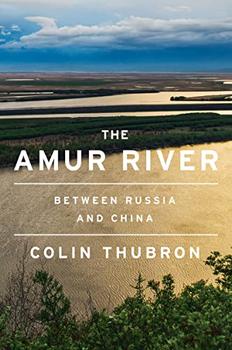Summary | Excerpt | Reviews | Beyond the Book | Readalikes | Genres & Themes | Author Bio

Between Russia and China
by Colin Thubron
I've borrowed Batmonkh's satellite phone, our only contact with the outside world that cannot help us, and I call my wife in London to say that all is well except for the heavy swamps. There comes the searchlight of her voice. Why do I sound strange?
Something has happened. Yes, I've had a couple of falls, but luckily I didn't break my glasses. She laughs. Is this a bad phone connection? You seem far away. Something to do with the satellite orbit ... I must be sounding sad, because she insists: 'Don't think of me until you come home.' Her voice carries a low, delayed echo. 'Think of your journey.' The roses are blooming in our garden, she says, and will last into winter.
* * *
We were entering a region that even the horsemen did not know. For four days they guided our way by the mountains that now surrounded us. To our south stood the massifs of Mount Khenti and Asralt – not Alpine peaks but ashen silhouettes eight thousand feet high. Ahead of us the Onon flowed invisibly – its course low and flat – through valleys of knee-high grass. Sometimes fir and pine trees descended to the marshlands, or retreated before lawn-smooth hills. From a distance the ground looked innocent, almost landscaped. But to either side of the river its tributaries seeped through a widening waterland where peat-moss and ground-smothering grasses – fescues, needlegrass – had rotted over the millennia into fathomless bog. We crossed to the river's south bank, then back again. It was higher now, faster-flowing, its banks clotted with willows. Our horses plunged in reluctantly. The riverbed was soft under their hooves. Soon I lost count of the tributaries we forded. Often they seemed as full and deep-sunk as the Onon itself. Batmonkh waved me away from the more precarious crossing places, but Mongo and Ganpurev charged in like centaurs, the current streaming over their knees, their cigarettes still dangling from their lips. Once, dropping down the Onon's banks, the packhorses panicked and refused, and had to be rounded up again, the horsemen clouting their flanks in retribution. The White Horse was old, and I felt a clutch of fear each time he descended, but his tread never slowed in midstream, and did not stumble.
We had no track to follow. Beneath grass the subsoil was a squelching morass that seemed only to deepen as we went. Each day, in eight hours' riding, we covered barely twenty miles, as the horsemen had predicted. Often the ground disappeared under a sheen of low-lying scrub, so that neither horse nor rider could see where it was treading. Sometimes this uncertain earth, mined with hidden quagmires, opened like a trapdoor under us. Suddenly the horses would be dropping to their withers and the peat-laden water brimming over their backs. Then they began to struggle out, their eyeballs white and bulging, their forelegs scrabbling for a hold, their hind legs kicking in panic, while we were thrown back and forth in the saddle.
It was in terrain like this that the White Horse sank into a hole and lost his footing. Tilted sideways in that rotting earth, he rolled and threw me. For an instant I found myself trapped beneath his heaving flank, my feet still in the stirrups, my ribcage screaming. Then he started up in fear, and began to bolt. I wrenched one foot free, but the other stayed wedged in its stirrup while he dragged me forward. But my trainer was loose-fitting, and I wrenched my foot out of it as he gathered speed. For a moment I lay in the marsh, oddly at peace, while the trainer went off on its own. But it wasn't funny: I had only one pair.
Batmonkh, on the far side of the swamp, saw the riderless White Horse emerge with only a mud-clogged plimsole in the stirrup. While the horsemen went to round it up, he called into the emptiness: 'Where are you? Can you stand up?'
I heard his voice plaintive and small across the wetland. I got up and walked towards it. There was something a little comical, I thought (but only later). My cut-price trainers, too loose to trap my feet, had saved me. While the other men wore knee-high boots which filled with swamp water, my plimsoles became squelching pouches of warmth. We had long ago ceased to care about the mud and bog water that sprayed up round us. Only at night our discarded footwear steamed by the camp fire alongside the horse blankets.
Excerpted from The Amur River by Colin Thubron. Copyright © 2021 by Colin Thubron. Excerpted by permission of Harper. All rights reserved. No part of this excerpt may be reproduced or reprinted without permission in writing from the publisher.
Your guide toexceptional books
BookBrowse seeks out and recommends the best in contemporary fiction and nonfiction—books that not only engage and entertain but also deepen our understanding of ourselves and the world around us.